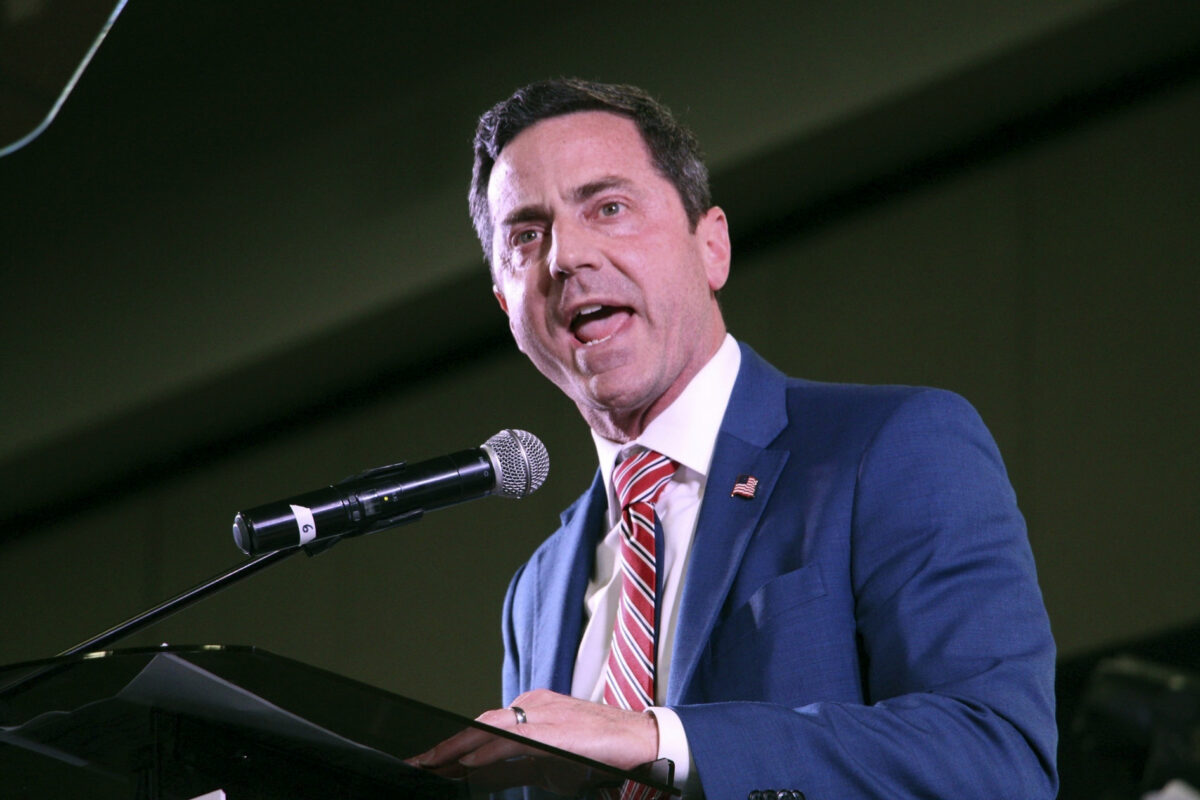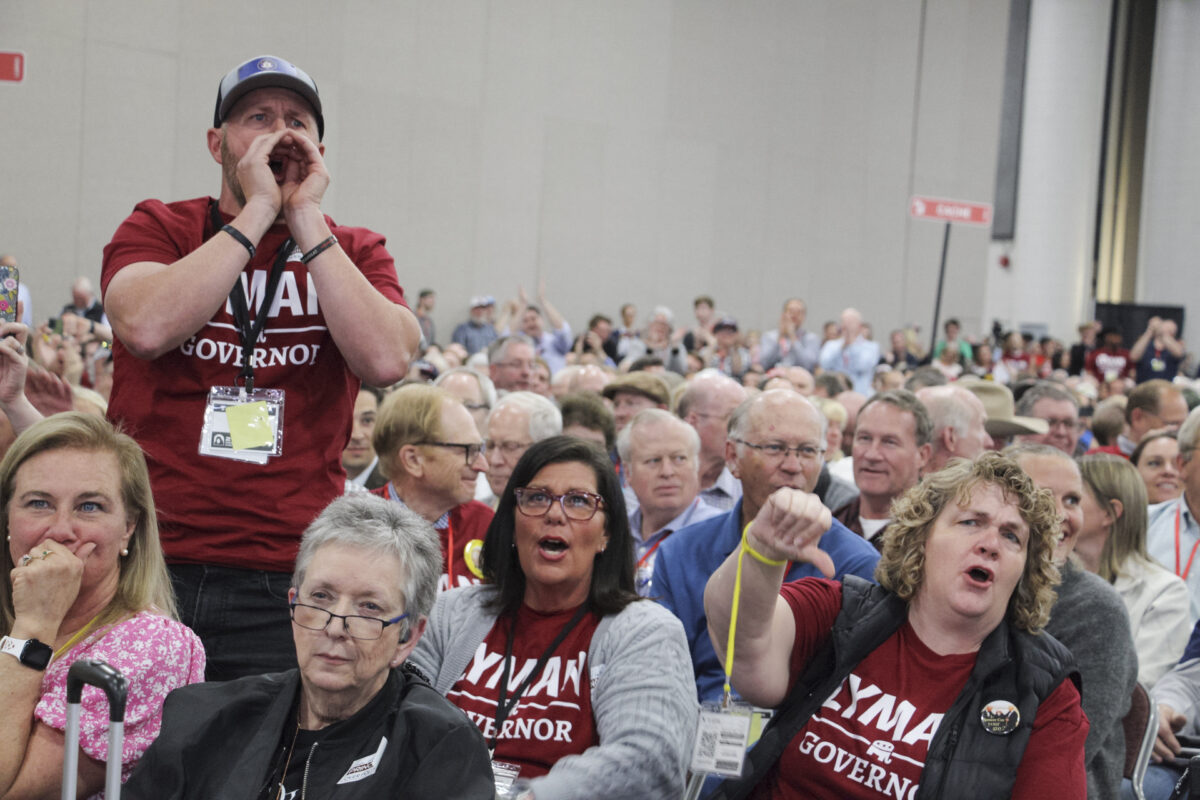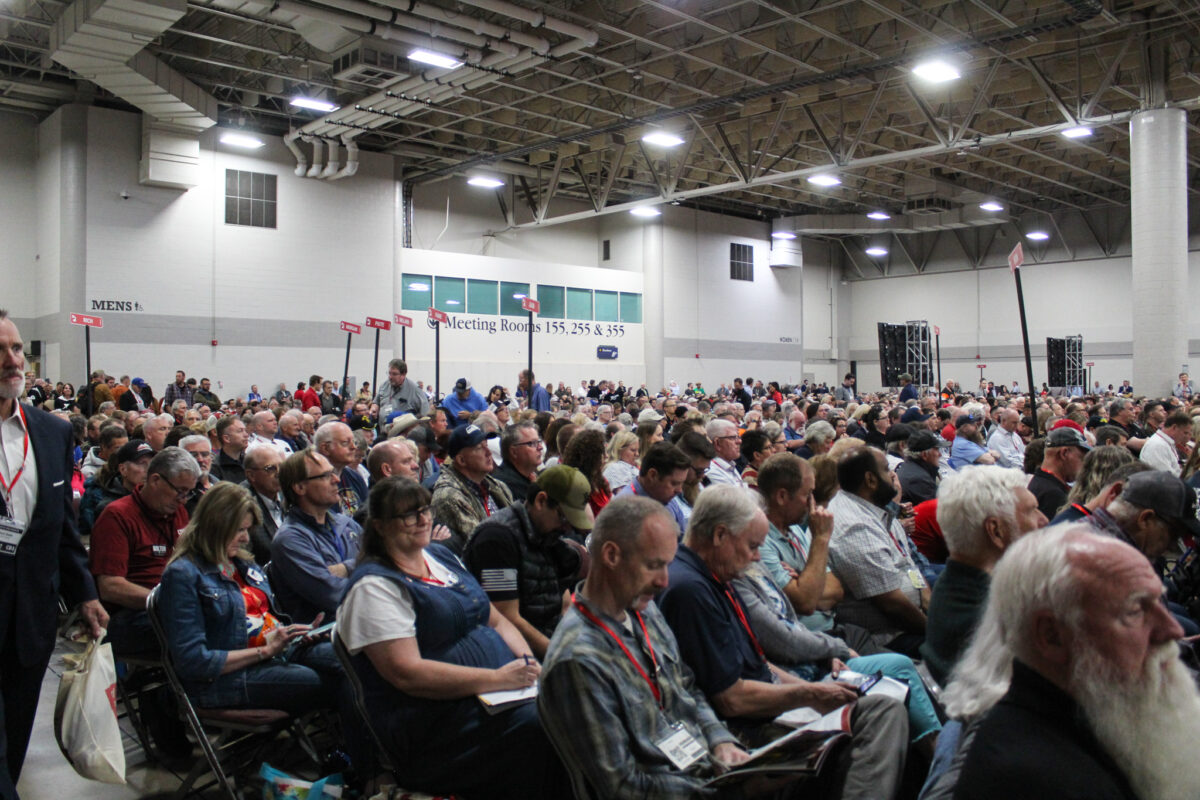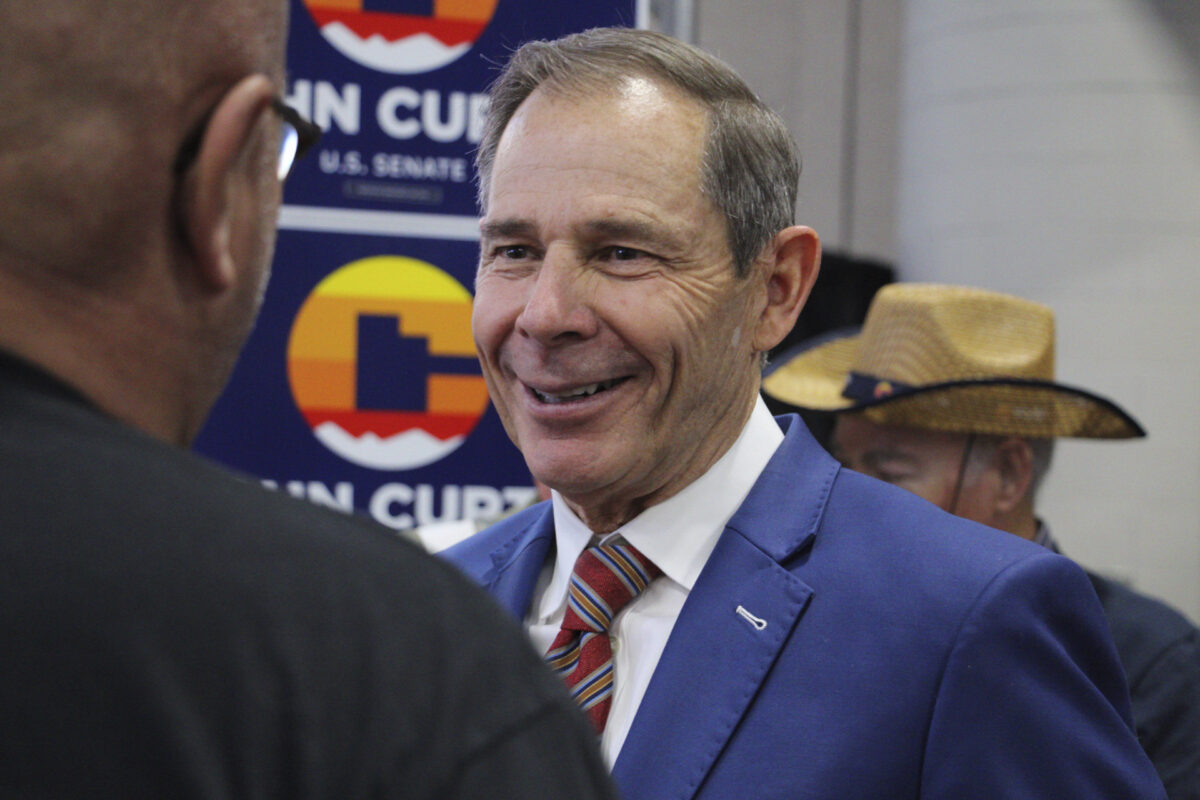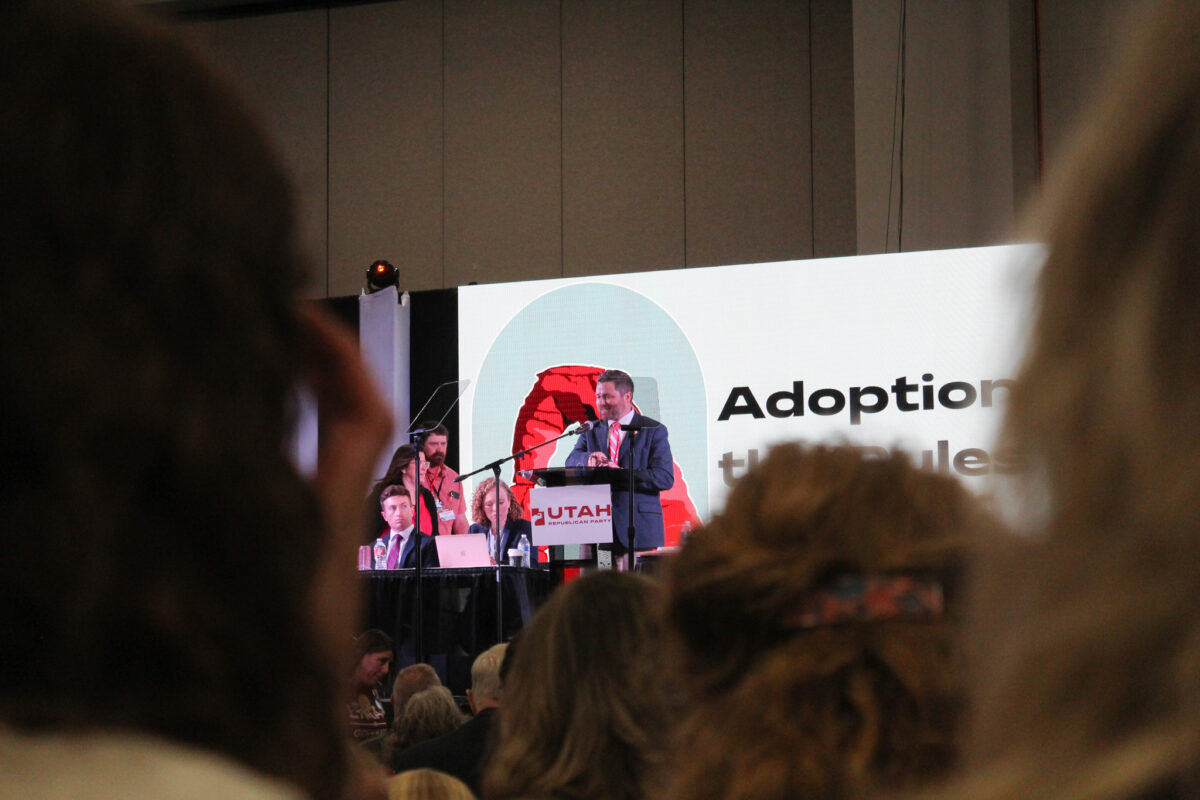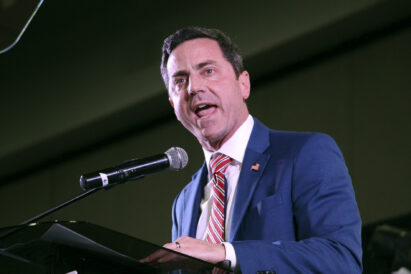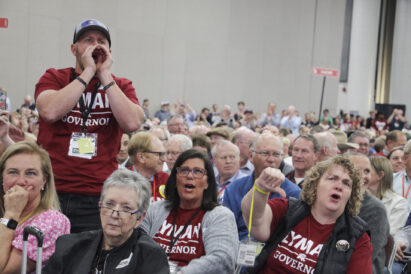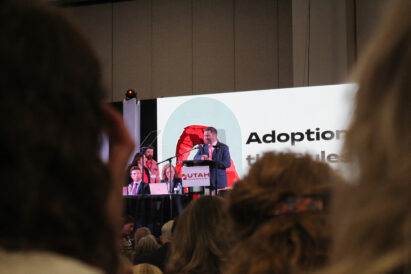Mike Kennedy, Trent Staggs win nominations for races at testy state GOP convention
- Delegates watch Utah Republican Party Chair Rob Axson speak at the state GOP convention on Saturday, April 27, 2024.
- Riverton Mayor Trent Staggs, a U.S. Senate candidate endorsed by former President Donald Trump, addresses delegates at the Utah Republican Party Convention on Saturday, April 27, 2024, in Salt Lake City.
- Supporters of Utah state Rep. Phil Lyman, a candidate for governor, and other Republican delegates boo incumbent Gov. Spencer Cox as he takes the stage at the Utah Republican Party Convention on Saturday, April 27, 2024, in Salt Lake City.
- Campaign signs for U.S. Senate candidates are displayed at the Utah Republican Party Convention on Saturday, April 27, 2024.
- Utah state Rep. Phil Lyman, a candidate for governor, addresses nearly 4,000 delegates at the Utah Republican Party Convention on Saturday, April 27, 2024, in Salt Lake City.
- Delegates attend the Utah Republican Party Convention in Salt Lake City on Saturday, April 27, 2024.
- U.S. Rep. John Curtis, a candidate for the U.S. Senate seat Mitt Romney is vacating, speaks to delegates at the Utah Republican Party Convention on Saturday, April 27, 2024, at the Salt Palace Convention Center in Salt Lake City.
- Utah Republican Party Chair Rob Axson gives the opening speech at the Utah GOP convention on Saturday, April 27, 2024.
Thousands of Republican state delegates gathered in Salt Lake City on Saturday to vote on nominations for GOP candidates in federal, state and multicounty races, including highly contested races for U.S. Senate and Utah’s 3rd Congressional District, as well as the Utah governor, attorney general, auditor, state Legislature and state school board races.
The convention went well over its scheduled time, with voting on a nominee for the U.S. Senate race lasting until nearly midnight, six hours after the convention was supposed to adjourn.
Federal races
State delegates selected Riverton Mayor Trent Staggs to be the party’s nominee for the U.S. Senate race to fill retiring Sen. Mitt Romney’s seat. Staggs received about 69% of the vote with U.S. Rep. John Curtis coming in behind him with about 30%.
Former President Donald Trump issued a last-minute endorsement in the race Saturday, posting his support for Staggs on the social media platform Truth Social, which Staggs proudly touted in his speech to delegates to their applause.
Ten candidates in total were vying for the Republican nomination. However, Curtis, former Utah House Speaker Brad Wilson and Jason Walton gathered enough signatures to move on to the primary without a nomination. Brent Hatch, son of the late Sen. Orrin Hatch, failed to gather enough signatures.
With Curtis running for U.S. Senate, the race for his seat in Utah’s 3rd Congressional District amassed nine candidates. State Sen. Mike Kennedy received the nomination with 61.5% after six rounds of voting to whittle down the nine-person candidate pool.
Four candidates gathered enough signatures for the primary ballot — current State Auditor John “Frugal” Dougall, Stewart Peay, Case Lawrence and JR Bird — leading to a five-way primary with Kennedy on June 25.
Sitting Congressman Burgess Owens of the 4th District ran unopposed this year.
In the 2nd Congressional District, Rep. Celeste Maloy, who won a special election race to succeed Chris Stewart late last year, came out behind in voting Saturday against challenger Colby Jenkins, 56.85%-43.15%.
First District Rep. Blake Moore similarly moved on to the primary after trailing an opponent. After Derek Draper, a former officer with the Ogden Police Department, was eliminated in the first round of voting, Moore totaled 45.14% of the vote in Round 2 compared to 54.86% for Paul Miller, an electrician from Ogden.
Statewide races
Gov. Spencer Cox faced multiple primary challengers this year — Carson Jorgensen, state Rep. Phil Lyman, Sylvia Fisk and Scott Robbins.
Fisk and Robbins received less than 1% of the vote in the first voting round, and Jorgensen got just under 26%, which eliminated the three candidates.
Lyman, from Blanding, received the party nomination with about 67%. Cox gathered signatures and will face Lyman in the primary.
Speeches for governor candidates got intense Saturday as Cox received a slew of boos with an intermingling of applause from delegates. Lyman received standing applause from many delegates as he spoke.
Lt. Gov. Deidre Henderson, Cox’s running mate, took to X, formerly Twitter, to condemn the “vulgarity and viciousness” she said was present at the convention.
“The GOP convention is no longer a family-friendly environment,” she wrote. “I’m mortified by the vulgarity and viciousness my young nieces were exposed to by another gubernatorial campaign’s supporters. It’s embarrassing, sad, and clearly no longer for kids.”
Utah Attorney General Sean Reyes did not seek reelection this year after questions arose due to his ties to Operation Underground Railroad founder Tim Ballard, who is being investigated for sexual assault claims.
Two GOP candidates — Rachel Terry and Frank Mylar — will move forward to the primary after Mylar barely fell short of the required 60% needed to be nominated. Mylar received 59.76% and Terry received 40.24%.
Derek Brown, a former Utah GOP Party chair who also is pursing the office, gathered enough signatures to be on the ballot.
Dougall is running for Congressional District 3, leaving his auditor seat open.
Two Republican candidates filed to run for the seat — Weber County Clerk/Auditor Ricky Hatch and Tina Cannon.
Neither received 60% of the vote, which is required to receive the nomination, so both will be moving on to the primary. Hatch received about 51% and Cannon just over 48%.
The state treasurer’s race only had one Republican candidate, incumbent Marlo Oaks.
State Legislature
Most state Legislature offices are voted on at county conventions, but state House and Senate seats encompassing more than one county are voted on at the state convention.
State Senate District 24, which currently is held by retiring Sen. Curt Bramble, had three Republican candidates — Rep. Keven Stratton, former Rep. Brad Daw and former Sen. Dan Hemmert.
Daw was eliminated in the first round of voting, with Stratton receiving about 57% and Hemmert about 43%. With neither receiving 60%, both will be on the ballot, though they also gathered signatures. Daw did not gather signatures and will not move forward.
Sen. Heidi Balderree in Senate District 22 faced two primary challengers, who also ran during the special election last October, where Balderree was first elected to replace Sen. Jake Anderegg, who had stepped down.
Both Garrett Cammans and Emily Lockhart gathered enough signatures, leading to a three-way primary for voters in June, with Balderre receiving the convention nomination with 70%.
State Board of Education
In Utah State Board of Education District 10, Monica Wilbur, who got 52%, and incumbent Matt Hymas, who got just under 48%, will be on the primary ballot. Camille Knudson was short 10 signatures to qualify for the primary.
Wilbur is supported by current state school board member Natalie Cline, who lost her reelection bid at the Salt Lake County GOP Convention after she came under fire this year for posting a photo of a teenage athlete and falsely implying she was transgender, leading to a slew of online attacks against the girl.
Cole Kelley won the nomination for District 12, defeating incumbent James Moss, who didn’t gather signatures, and will be the sole Republican candidate in June.


